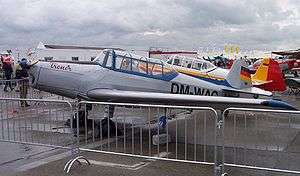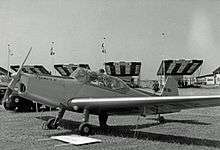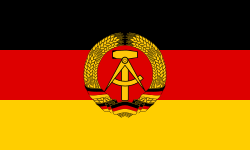Zlín Z 26
The Zlin Trener is a family of aircraft that was based on a basic training aircraft, the Z-26.
| Trener | |
|---|---|
 | |
| Z-126 Trener II | |
| Role | Training aircraft |
| Manufacturer | Moravan Otrokovice |
| Produced | 1948–1977 |
The original Z-26 was designed in the 1940s and produced in 1946 by the Czechoslovakian company, Moravan to meet a requirement for a basic trainer to replace the Bücker Jungmann and Bestmann. It was a low-wing monoplane of mixed construction, with wooden wings and a welded metal tube fuselage, powered by a single four-cylinder piston engine, the Walter Minor 4-III. It first flew in early 1947, proving superior to the competing Praga 112, and was declared the winner, entering production in 1948.[1]
Later Z-26 variants were optimised to participate in aerobatic competitions and many were owned by private pilot owners. Both the two-seat Trener and the single-seat Akrobat were considered highly successful, winning several aerobatic awards in the 1960s.[2]
Variants

The following variants were progressive improvements on the Z-26:
- Z-26 – two-seat primary trainer aircraft. 163 built.[3]
- Z-126 – introduced in 1953, Czech military designation C-105, all-metal wing instead of original wooden wing.[2]
- Z-226 – more powerful Walter Minor 6-III six-cylinder engine, C-205
- Z-226A – single-seat aerobatic aircraft
- Z-226B – glider tug aircraft
- Z-226T – basic training version
- Z-326 – Introduced in 1959, with an electrically retractable undercarriage (standard on future models)[2]
- Z-526 – with the Walter 6-III carburettor's six-cylinder engine
- Z-526A – single-seat aerobatic aircraft
- Z-526F – Improved version. M-137 engine with fuel injector.
- Z-726 – modified 526 with shortened wings and fuselafe
- Z-726K – with Walter M 337 supercharged engine
In 1956, deliveries began of the Z326 Trener-Master and Z326A Akrobat.[2] Many sub-variants were also produced, for example the Z-526A and Z-526AFS were aerobatic specials. The production of the family was terminated in the 1970s with Z-726. The Z-726 Universal had reduced wingspan.[2]
Operators
Military operators

- Austrian Air Force


- Czechoslovakian Air Force





Specifications (Z-726)
Data from Jane's All The World's Aircraft 1976–77 [5]
General characteristics
- Crew: two
- Length: 7.975 m (26 ft 2 in)
- Wingspan: 9.875 m (32 ft 5 in)
- Height: 2.06 m (6 ft 9 in)
- Wing area: 14.89 m2 (160.3 sq ft)
- Airfoil: root:NACA 2418; tip:NACA 4412
- Empty weight: 700 kg (1,543 lb)
- Max takeoff weight: 1,000 kg (2,205 lb)
- Powerplant: 1 × Avia M 137AZ 6-cyl, air-cooled inverted in-line piston engine, 134 kW (180 hp)
Performance
- Maximum speed: 236 km/h (147 mph, 127 kn)
- Cruise speed: 216 km/h (134 mph, 117 kn)
- Stall speed: 98 km/h (61 mph, 53 kn) (flaps down)
- Range: 440 km (270 mi, 240 nmi)
- Service ceiling: 4,500 m (14,800 ft)
- Rate of climb: 5 m/s (980 ft/min)
See also
![]()
References
- Mourik 2001, p.61.
- Frawley 1997, p.198.
- Taylor 1989, p.908.
- Mourik 2001, p.64.
- Taylor 1976, pp. 33–34.
- Frawley, Gerard. The International Directory of Civil Aircraft. Aerospace Publications Pty Ltd, 1997 ISBN 1-875671-26-9
- Mourik, Dick van. "A to Zlin: An Illustrated History of a Light Aircraft Dynasty". Air Enthusiast, No. 93, May/June 2001. Stamford, UK:Key Publishing. ISSN 0143-5450. pp. 59–65.
- Taylor, John W R. (editor). Jane's All The World's Aircraft 1976–77. London: Jane's Yearbooks, 1976. ISBN 0 354 00538 3.
- Taylor, Michael J.H. (editor). Jane's Encyclopedia of Aviation. London:Bracken Books, 1989. ISBN 1 85170 324 1.